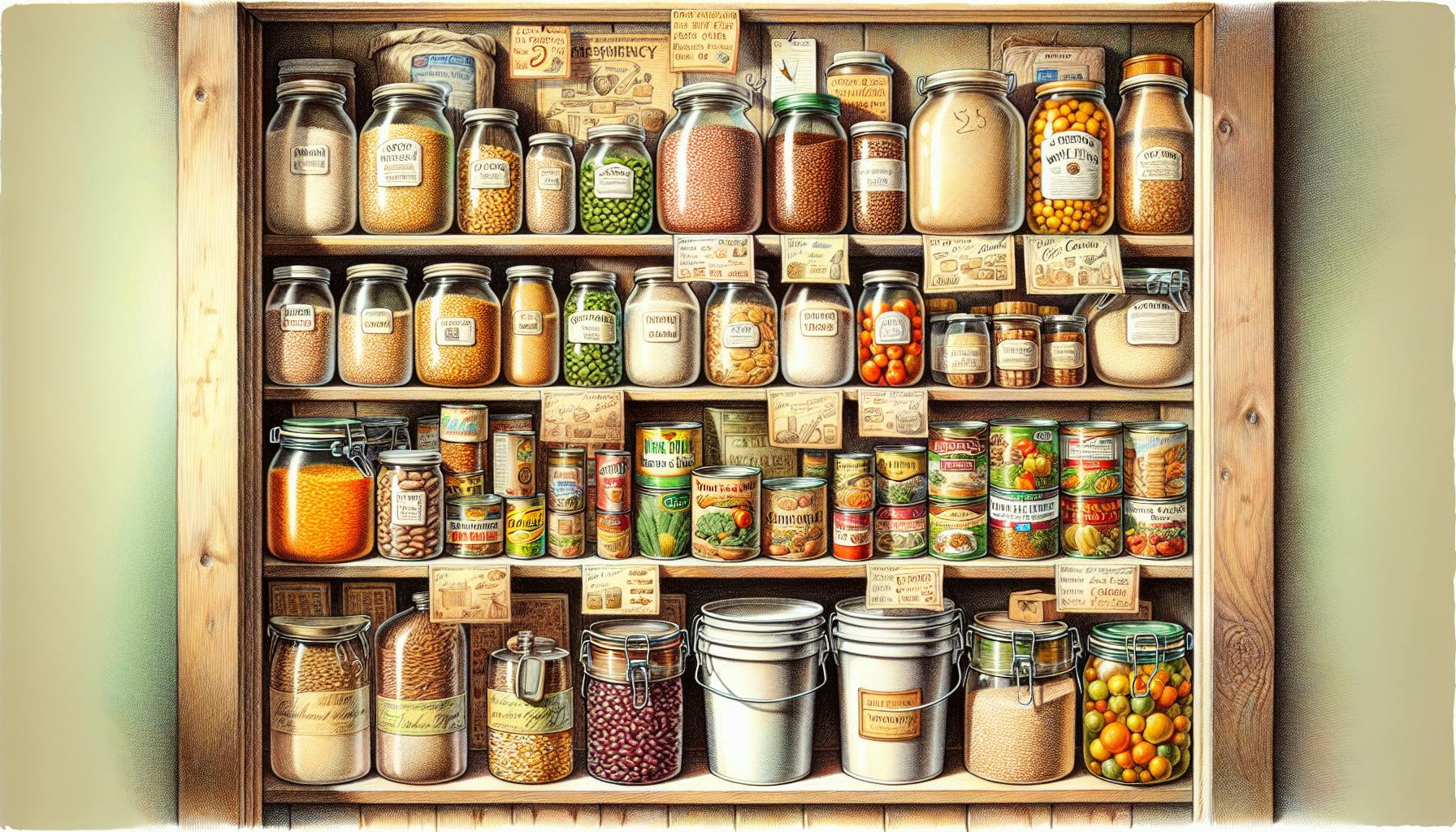Introduction to Canned Vegetables for Stockpiling
Canned vegetables are a pantry staple for preppers and should be an essential part of any emergency food supply. While fresh produce is ideal, having a variety of canned veggies can provide much-needed nutrients when access to fresh foods is limited. Canned vegetables have a number of benefits that make them well-suited for stockpiling and disaster readiness.
Benefits of Canned Vegetables for Stockpiling
Canned vegetables provide many advantages for stockpiling:
-
Canned veggies are nutritious - they are picked and packed at peak ripeness and undergo a canning process to lock in nutrients. Common canned vegetables like carrots, green beans, corn, and tomatoes provide vitamins A, C, K, fiber, potassium and more. The canning process helps retain heat-sensitive nutrients like vitamin C and lycopene compared to freezing.
-
Canned goods are budget-friendly and the best value for stocking up on key staple vegetables, allowing you to buy in bulk. Per ounce, canned vegetables are an affordable way to store veggies long-term.
-
Properly stored canned vegetables can last 2-5 years or longer, making them ideal for an emergency pantry and stockpile rotation. The canning process gives them a long shelf life compared to fresh or frozen options.
-
Canning prevents nutrient loss compared to freezing vegetables. Heat-sensitive nutrients like lycopene in tomatoes and vitamin C in greens beans are retained through proper canning methods.
-
With endless options - from beans to beets - stocking up on canned vegetables allows you to store a diverse selection of flavors, textures, and versatility. You can prepare quick meals with canned goods when fresh isn't available.
Selecting Quality Canned Vegetables
Not all canned veggies are created equal. When stocking your emergency pantry, be selective:
-
Seek lower sodium options with minimal added sugar or preservatives. Canned veggies often have excess sodium, so compare brands and read labels.
-
Choose BPA-free cans when possible to avoid potential health risks from can linings containing BPA. Many brands like Eden Foods now offer BPA-free cans.
-
Look for USDA Organic or Non-GMO Project Verified labels when available for higher quality ingredients.
-
Stick to reputable, trusted brands like Del Monte, Hanover, Libby's using high standards for properly canning vegetables. Established national brands typically have dialed-in canning practices.
-
Compare cost per ounce or serving when buying vegetables in bulk or cases. Bargain single cans may cost more per serving compared to case sizes.
Storing Canned Goods Properly
To maximize shelf life, be sure to store canned vegetables properly:
-
Store cans in a cool, dry place in the 50°F to 70°F range, if possible. A root cellar or basement provides more ideal cool conditions. Avoid temperature extremes.
-
Keep canned goods in a dark pantry or cupboard away from light. Light can compromise cans over time.
-
Organize and label foods with FIFO (first-in, first-out) rotation in mind by dates. Use older cans first before expiration dates.
-
Inspect cans periodically and watch for bulges, leaks, corrosion, rust or damage which can indicate spoiled food.
-
Consider keeping an inventory list to monitor expiration dates and track your supply levels for rotation.
Best Canned Vegetables for Stockpiling
Among the wide range of canned vegetable options, these are top picks:
-
Green beans - Packed with vitamin C, vitamin K, and manganese. Different varieties suit different recipes.
-
Sweet corn - Provides vitamin C, folate, and lutein. Its sweet flavor livens up many dishes.
-
Carrots - Excellent source of beta carotene for vitamin A, vitamin K, and biotin. Carrots add nutrition and sweetness.
-
Beets - High in nutrients like folate, manganese, and antioxidants like betalains. Vivid beets perk up meals.
-
Mushrooms - Low in calories yet high in riboflavin, selenium and B vitamins. Adds savory umami taste.
-
Pumpkin - Rich in vitamin A, antioxidants, and fiber. Purees into soups, baked goods, smoothies.
-
Tomatoes - Full of antioxidant lycopene. Versatile base for sauces, salsas, soups.
Tips for Building Your Canned Vegetable Stockpile
Start stocking up on nutritious and versatile canned vegetables with these tips:
-
Begin with cases of 2-3 veggies your household regularly eats such as green beans, corn, peas.
-
Over time, continue expanding variety of canned goods for diverse flavors and recipes.
-
Buy in bulk or take advantage of sales to get the best deals when stockpiling.
-
Purchase various can sizes like 14 oz, 28 oz, and #10 cans for variety.
-
Aim for at least a 3-month supply of canned veggies based on your family's typical consumption.
-
Use a FIFO system - rotate oldest canned foods to front and use them first before expiration.
The Best Canned Vegetable Options to Prioritize
Diving deeper into the benefits and best uses for top canned vegetables for stockpiling:
Green Beans
Packed with vitamin C, vitamin K, and manganese. Different varieties like French-style or cut green beans suit different recipes. Top brands like Del Monte and Hanover rate well in taste tests.
- Saute green beans with olive oil, garlic, salt, and pepper for easy side dish
- Incorporate into casseroles, soups, stews, pasta salads for color and crunch
- Toss with roasted potatoes and mushrooms for green bean salad
Sweet Corn
Provides vitamin C, thiamine, folate, and lutein. Premium whole kernel is best vs cream style. Leading brands include Green Giant, Del Monte, Libby's.
- Serve corn warmed as a simple veggie side dish
- Mix into chowders, chilis, fritters for sweet burst of flavor
- Combine with black beans, peppers, cilantro for taco salad
Carrots
Excellent source of beta carotene for vitamin A, vitamin K, and biotin. Whole or sliced carrots suit different needs. Reputable brands include Glory Foods, Hanover, Del Monte.
- Roast canned carrots with olive oil, garlic, rosemary, thyme
- Puree into soups for natural sweetness and color
- Mix into stews, pot pies, fried rice, quinoa for crunch
Beets
High in folate, manganese, and antioxidants like betalains giving their color. Pickled, whole, diced options. Quality brands like Love Beets, Glory Foods, Del Monte.
- Marinate with balsamic vinegar, walnuts, goat cheese for bright side salad
- Purée into gazpacho or borscht soups
- Roast then top with oranges, arugula for a flavorful pairing
Mushrooms
Provide B vitamins like riboflavin and selenium. Buy buttons, portobello or mixed. Seek cans with mushrooms packed in water vs salt or oil.
- Sauté and add to omelets, pastas, pizzas for meaty texture
- Mix into sauces, gravies, soups to add savory umami flavor
- Stuff mushrooms with cheese, breadcrumbs, roast for appetizer
Pumpkin
Rich in vitamin A, potassium, fiber and antioxidants. Trusted brands like Libby's dominate the market.
- Purée into soups, smoothies, oatmeal
- Bake into muffins, breads, pancakes
- Mix into yogurt, chia pudding, oats for breakfast
Tomatoes
Full of antioxidant lycopene. Whole, crushed, diced and sauce options. Look for BPA-free cans.
- Make pasta sauce, chili, salsa, soup bases
- Top pizzas, bruschetta, nachos for fresh flavor
- Add to casseroles like lasagna for richness
Incorporating Canned Vegetables into Meal Planning
Canned vegetables can be elevated into delicious everyday meals with a bit of creativity. Here are some tips for preparing canned veggies:
Elevating Plain Canned Vegetables
- Roast or sauté canned vegetables to intensify flavor
- Season with olive oil, spices (garlic, oregano, cumin), salt, pepper
- Stir in nuts like almonds or walnuts for crunch
- Top with fresh herbs like parsley or cilantro
- Serve canned vegetables over brown rice or quinoa for a complete meal
Meal Prep Tips
- Make veggie-packed soups, chilis and stews in big batches using canned goods
- Prepare sauces, dips, dressings with canned pumpkin, tomatoes, beans
- Roast canned vegetables like carrots and beets in bulk for quick sides all week
- Portion canned corn, beans, peas into containers as grab-and-go sides
Canned Vegetable Flavor Pairings
- Green beans + mushrooms, tomatoes, potatoes, bacon
- Corn + black beans, peppers, onion, cilantro
- Carrots + peas, onion, dill, cinnamon
- Beets + goat cheese, walnuts, oranges, arugula
- Mushrooms + peas, greens, garlic, onion
- Pumpkin + cinnamon, nutmeg, ginger
- Chickpeas + tahini, olive oil, za'atar
Creative Canned Vegetable Recipes
- Pickle canned beets or carrots for tangy, crunchy sides
- Whip up veggie fritters or pancakes with corn, carrots, beans
- Mash white beans into dips, spreads, veggie burgers
- Roast seasoned chickpeas for plant-based taco "meat"
- Puree canned pumpkin for soups, smoothies, baked goods
- Make a hearty minestrone soup with tomatoes, beans, vegetables
- Prepare vegetarian chili with corn, beans, tomatoes, peppers
Sample Meals with Canned Vegetables
- Veggie fried rice with peas, carrots, corn, mushrooms
- Minestrone soup with beans, spinach, tomatoes, pasta
- Taco bowls with chickpeas, corn, black beans, peppers
- Lentil shepherd's pie with carrots, peas, potatoes
- Curried chickpea salad sandwiches with carrots, onion
- Pumpkin maple oatmeal with canned pumpkin, oats, cinnamon
- Pizza with tomato sauce, mushrooms, roasted veggies
Weekly Meal Plan with Canned Vegetables
Here is a sample weekly meal plan incorporating a variety of nutritious canned vegetables:
Monday: Lentil Shepherd's Pie with ground lentils, canned carrots, peas, and mashed potatoes on top
Tuesday: Veggie & Barley Soup with canned tomatoes, corn, green beans, mushrooms, and spinach
Wednesday: Pumpkin Maple Overnight Oats with canned pumpkin, oats, yogurt, maple, cinnamon
Thursday: Veggie Burgers on buns with mashed chickpea patties, sliced canned beets, tomatoes, greens
Friday: Pizza Night with whole wheat crust, canned tomato sauce, mushrooms, roasted peppers, onion
Saturday: Vegetarian Chili with kidney beans, canned corn, fire roasted tomatoes, bell pepper
Sunday: Taco Bar with seasoned chickpeas, canned black beans, corn, cabbage, salsa
Conclusions on Stockpiling Nutritious Canned Vegetables
Maintaining a variety of canned vegetable options is a vital part of emergency preparedness. Focus on nutrient-dense vegetables your household enjoys and aim for diversity across flavors, textures and can sizes. Prioritize versatile classics like beans, tomatoes, carrots, pumpkin and stock up when sales allow. Properly store and rotate canned goods. With the right selection of canned produce in your pantry, you'll be ready to put together healthy, hearty meals in times of need. Stockpiling canned vegetables can provide affordable, long-lasting nutrition your family needs.


